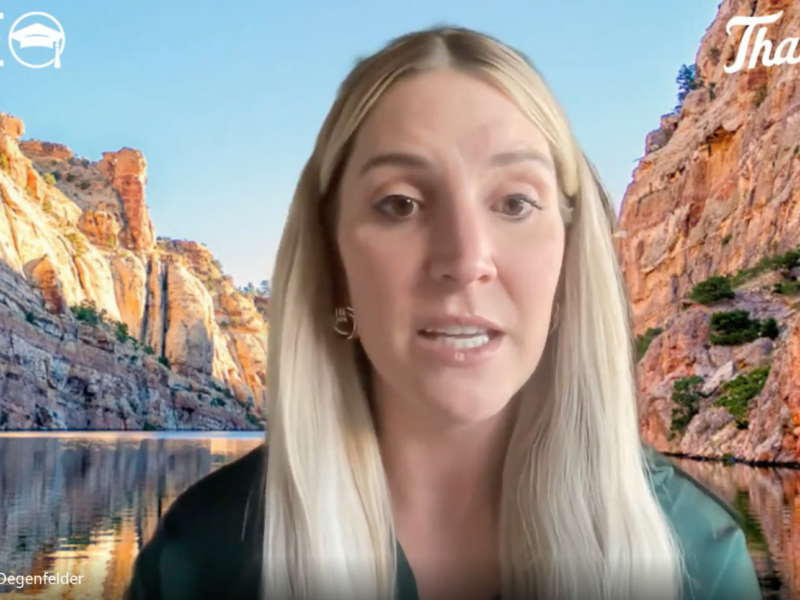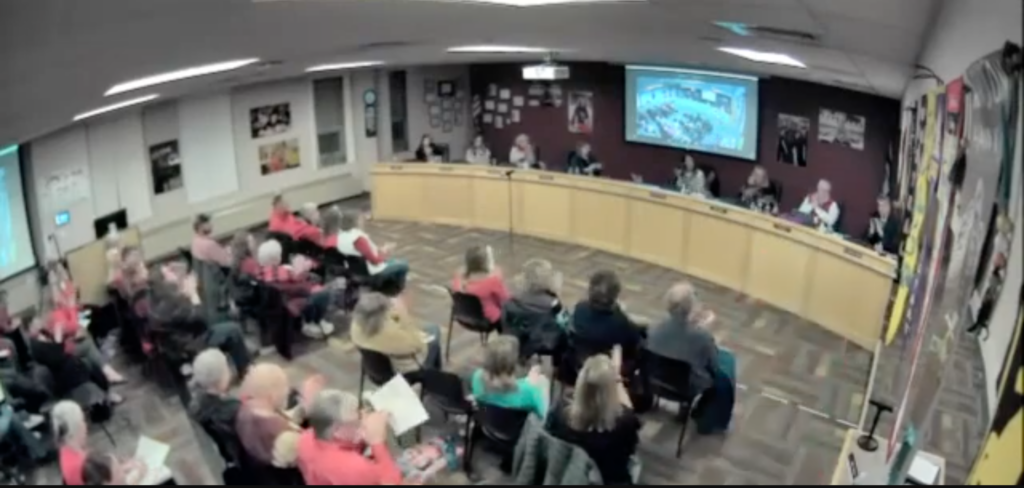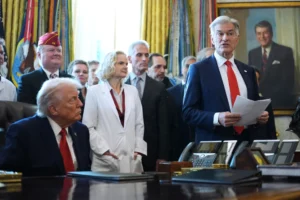EXCLUSIVE: Superintendent Degenfelder on Her Push to Restrict ‘Explicit’ Books in Schools
Wyoming education leader pressed on controversial debate over students’ access to library materials
- Published In: Politics
- Last Updated: Dec 06, 2023

In an interview with the Wyoming Truth last week, Superintendent Megan Degenfelder was pressed about why and how she has prioritized the issue of "explicit" books in schools during her first year in office. (Wyoming Truth photo by Jacob Gardenswartz)
By Jacob Gardenswartz
Special to the Wyoming Truth
Late Monday night, the Laramie County School District 1 (LCSD1) Board of Trustees approved a controversial new policy that would greatly restrict students’ access to library books and materials — part of a broader push throughout the state and nation to curb access to books deemed “explicit.”
LCSD1’s new policy will replace the previous “opt-out” approach, whereby parents could prohibit their children from checking out any books they found inappropriate via an online portal, with an “opt-in” approach, in which parents must affirmatively choose to allow their children access to library materials. Critics of the opt-in method have labeled it a “book ban,” and a majority of public comments at Monday’s meeting supported the current policy — despite trustees’ 4-2 vote in favor of adopting the new one.
Wyoming Superintendent Megan Degenfelder has made addressing school library policies a priority during her first year in office, recently releasing non-binding guidelines — which highlighted the LCSD1 policy draft — for districts considering updating their rules. Reached for comment Tuesday, a spokesperson for Degenfelder declined to comment on the vote to approve LCSD1’s new policy, noting the superintendent was “traveling and unavailable.”
The Wyoming Truth spoke with Degenfelder before the vote took place about her stance on the issue. Excerpts from the conversation appear below. Check back for a follow-up conversation with a chief opponent of the new LCSD1 policy.

How did addressing “explicit” books in school libraries become a priority of your administration?
Degenfelder: During the campaign, during the primary alone, I traveled over 40,000 miles to every corner of the state attending county fairs, candidate forums, tabling at summer festivals, you name it. And that is where I was approached by citizens about their thoughts, ideas, concerns . . . . And one of the most prevalent concerns was regarding inappropriate materials in schools— from critical race theory to sexually explicit library books. And so I made a promise to my constituents that I would address the issue and fight for the safety of our Wyoming children.
There’s been criticism of the push to restrict library materials as a solution in search of a problem.
Degenfelder: I would absolutely disagree that it’s not an issue in Wyoming… Look, when it comes to sexually explicit materials, I didn’t believe it was as serious as it is, either. And I did my own research, dug into the books, purchased them, spoke with parents that had situations in schools and recognized it is an issue in Wyoming. Maybe it’s not everywhere. We have a lot of great librarians; we have a lot of great schools. But even in one school, one book is just too many for me. And for me, it’s really about rebuilding the trust in our public education system I believe so passionately in.
What were your conversations like with school officials and librarians?
Degenfelder: I met and spoke with the Wyoming Library Association’s SLIG [School Library Interest Group]. I had a meeting with them, discussed the ability for the state to provide greater resources and support for librarians, and so we’re just starting to dig into that. It’ll be the next step in this journey as it relates to library materials.
My first week in office, we actually launched the teacher retention and recruitment task force, and then hosted a statewide teacher survey. Because as we talked about teacher retention and recruitment, I wanted to know directly from teachers how we could aid in that. And what we’ve really found are three overarching areas we’ve begun to address: 1) compensation, 2) support from administrators and 3) behavioral issues with students.
Where do the library guidelines fit into those areas?
Degenfelder: I believe that it actually creates a positive impact on teacher retention and recruitment. Most people agree: discussions of sensitive topics like these, as we talk about sexually explicit books, belong in the home with the child’s parents. Our teachers and administrators deserve a transparent and collaborative library material policy to assist them in navigating their own roles.
Some educators have expressed worries it might exacerbate the recruitment issues.
Degenfelder: What’s really great about the library material guidance we put out is that the cabinet, in general, came to full consensus that this [should] not be a top-down approach, that this [should] be provided as guidance, that really it is about local school districts making the decisions that best meet their needs and the parents in their community. This serving is a resource, getting those discussions going, providing best practices.
Apart from the one example you mentioned in your press conference, what specific “explicit” texts have you identified as particularly prevalent in schools?
Degenfelder: I’ve had this issue brought to me from parents and community members from all different districts in the state. And while we don’t have a complete audit of all books that we’re talking about, for me, I believe any book that includes sexually explicit content has no place in our schools, especially for students under the age of sexual consent. That is well beyond the scope of sexual education.
You have noted that defining what is “sexually explicit” is incredibly difficult. One parent might find a certain book explicit while another might not. How should schools navigate that?
Degenfelder: For me, it’s graphic, sexually explicit, arousing or stimulating material. But to your point, it can be very difficult to define. And that’s why it was so important for us to come out with guidance for districts to begin discussing this, and why it’s so critical that districts have policies in place, they have sexually explicit defined so that librarians, our staff, know what is covered in those policies, how it is defined, and making sure that everyone’s on the same page.
When it comes to a particular parent with a concern over their child, they absolutely have the right to direct their child’s education and decide what’s appropriate. But when we’re talking about these overarching policies, I believe that’s why it’s so important to define what sexually explicit means.
The example definition provided in the guidelines came from a draft library materials policy in LCDS1, which had yet to be approved and generated significant debate. Why include that?
Degenfelder: As the state’s largest school district, Laramie County School District 1 has a lot of expertise both in the district and community. The committee knew that an enormous amount of effort from district professionals and community members had gone into that draft policy. So we felt it could be informative for other districts choosing to address the topic, and as I mentioned during the press conference, we will continue to update resources based on policy creation and changes from districts all across the state. That particular policy, along with any of those provided from several other districts, are really drafts for consideration. They’re not binding or exclusive. And we’ll continue to update those as well.
Just to clarify, you’re saying the inclusion of a policy on the state’s guidelines should not be interpreted to mean that policy is recommended to other districts?
Degenfelder: Nothing in our guidance is binding. There is no enforcement of this library policy. What it is meant to do is provide resources for local school districts and boards of trustees to begin to discuss their policies and to really use these as resources, so as not to recreate the wheel, but make sure that in creating a policy, they have all the best practices in place, they know what other districts are doing and they can create the policy that best suits them.













